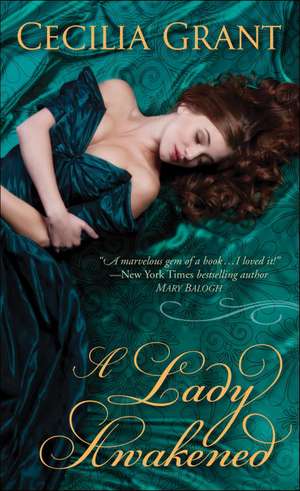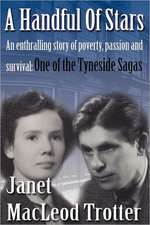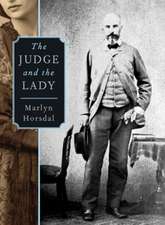A Lady Awakened
Autor Cecilia Granten Limba Engleză Paperback – 30 noi 2011
Newly widowed and desperate to protect her estate and beloved servants from her malevolent brother-in-law, Martha Russell conceives a daring plan. Or rather, a daring plan to conceive. After all, if she has an heir on the way, her future will be secured. Forsaking all she knows of propriety, Martha approaches her neighbor, a London exile with a wicked reputation, and offers a strictly business proposition: a month of illicit interludes . . . for a fee.
Theophilus Mirkwood ought to be insulted. Should be appalled. But how can he resist this siren in widow’s weeds, whose offer is simply too outrageously tempting to decline? Determined she’ll get her money’s worth, Theo endeavors to awaken this shamefully neglected beauty to the pleasures of the flesh—only to find her dead set against taking any enjoyment in the scandalous bargain. Surely she can’t resist him forever. But could a lady’s sweet surrender open their hearts to the most unexpected arrival of all . . . love?
Preț: 55.44 lei
Nou
Puncte Express: 83
Preț estimativ în valută:
10.61€ • 11.53$ • 8.92£
10.61€ • 11.53$ • 8.92£
Carte disponibilă
Livrare economică 01-15 aprilie
Preluare comenzi: 021 569.72.76
Specificații
ISBN-13: 9780553593839
ISBN-10: 0553593838
Pagini: 362
Dimensiuni: 110 x 185 x 25 mm
Greutate: 0.18 kg
Editura: Bantam
ISBN-10: 0553593838
Pagini: 362
Dimensiuni: 110 x 185 x 25 mm
Greutate: 0.18 kg
Editura: Bantam
Notă biografică
Cecilia Grant always knew she’d do something with that English degree. After waiting tables, composing software help files, and answering the carpool-lane-violators hotline, she’s delighted to be writing stories. Cecilia makes her home in the Pacific Northwest with her fellow-writer husband, two bookish children, and unliterary cat and dog.
Extras
Chapter One
Not once in ten months of marriage had she wished for her husband’s demise. Nor would she be glad of the occurrence even for a moment. Even for this moment. To do so would ill become her.
Martha sat straighter in her chair, smoothing her black skirts. One’s conduct might owe more to principle than to sentiment at times, admittedly. But principle could be relied upon. Principle steadied a person; braced her up through those same occasions, in fact, where sentiment made only a sluggish kind of mire to sink into.
She finished with her skirts and folded her hands on the tabletop. “Well,” she said into the silence of her sunlit parlor. “This is all legally sound, I don’t doubt.”
Mr. Keene gave a little bow from his place at the table’s foot, affording her a glimpse of the bald spot atop his head. He did not meet her eyes and had not done so since beginning to read. A faint sifting sound came from the papers before him, as his hands lined up the corners and made other adjustments of no particular purpose. Really, he ought to stop that.
Across the table her brother sat tight-lipped, his jaw working as if to swallow something of fearsome dimension. His temper, that would be. To his credit, he always did try.
“Speak, Andrew.” She knew well enough what he would have to say. “You’re liable to do yourself some injury otherwise.”
“I’d have done injury to Russell if I’d known what he was about. A thousand pounds!” He spat out the sum like a mouthful of spoiled porridge. “One thousand, from what began as ten! What kind of man would speculate with his wife’s settlement?”
A man half lost in drink apparently would. To take just one example. She drew a fortifying breath. “It’s not as though I’ll be penniless. I’ll have my dower.”
“No dower house, though, and but a tenth of what you brought into the marriage. I’m sure I’d like to know his reasoning.” This, rather pointedly, to Mr. Keene.
“I wouldn’t have encouraged the investment myself,” came the solicitor’s reedy voice as he went on shuffling papers. “But Mr. Russell had a taste for those things. His will with the first Mrs. Russell was similar: her portion invested in private securities, and all the rest arranged in hopes of an heir.” An heir, of course. If there was any man on earth more eager to get an heir than her husband had been, she should like to see him.
Well, no. In fact she wouldn’t care to see that man at all. She unlaced her hands and touched her fingertips to the tablecloth. Very pretty, this cloth. Linen, from Belgium, and no longer hers.
“I wish I’d had my own solicitors see to your marriage agreement. I would have had nothing to do with this trust.” More bad porridge. “Father’s people were worse than useless. I ought to have done it myself.”
“How could you have managed?” One had neither time nor patience for this sort of nonsense. I wish I’d done this; I would have done that; I ought to have done some other thing. Blind alleys, those were, leading straight to the swamp of sentiment and nowhere else. “You had your hands full settling Father’s estate. Those were difficult days for us all. What’s done is done. We needn’t say any more about it.”
Andrew held his tongue, then, but his eyes—large, liquid, dark as day-old coffee—glowed with strong opinions. She angled her head politely away. So indecorous, to let the mood of any moment run rampant across one’s face. So undisciplined. For all that she had those same eyes, she’d long since schooled them into sphinxlike calm. It really wasn’t hard.
“So when is she to be turned out of her home?” he said upon reaching the limits of forbearance. “How soon will this other Mr. Russell expect to take possession? Of course you will come to stay with me and Lucy,” he added to her without waiting for the solicitor’s reply. “When we go to the country you may even have your old room.”
And live as a dependent child again, for all that she was one and twenty. A burden to him and his wife. Something stirred in the pit of her stomach: tiny fragments of mutiny, chasing about as pointlessly as rubbish in a windstorm.
Mr. Keene inclined his head so as to show her the bald spot again. “In these cases, we generally don’t proceed until the widow assures us there is no possibility of a son.”
Well, there wasn’t. Her body had resolved that some three days since, and brought her the news in its usual fashion. For all of Mr. Russell’s most vigorous efforts, on her and presumably on his first wife, no child had ever resulted. Now no child ever would.
Was she expected to say so on the spot? Mutiny stilled her tongue. If she left the matter in some doubt, she could get a few more weeks here. Maybe as much as a month.
Of course if she were truly mutinous . . . well, one heard tales of what desperate childless widows occasionally did. Lurid tales, difficult to credit. What woman could ever be so desperate? Probably it was all some myth got up and passed about by wishful men.
She lifted her chin. “I will send you word when I know that question to be resolved.” She could see to the servants, at least. Mr. and Mrs. James Russell would bring servants of their own, making some of the Seton Park staff redundant. She would take what time she needed to get them placed out.
Andrew fidgeted silently for the several minutes Mr. Keene took to gather up his papers and make polite remarks, and when the solicitor was finally shown out, her brother quitted his chair with vehemence. “For the love of God, sister, will you never speak up for yourself?” He strode away to the table’s other end. “It’s not right, how you’ve been served in all this. Why must I be the only one with the fortitude to say so?”
A familiar coolness blossomed in the middle of her chest and seeped outward. “I see no question of fortitude.” She measured out her syllables, and folded her hands atop the table again. “I could speak of injustice, I suppose, and indulge myself with some show of outrage, but none of that would change the facts of my current situation, would it?” Her voice grew flatter and flatter, like pastry dough under a most adamant rolling pin.
“Not now, it wouldn’t.” He flung out his hand in an impatient gesture. “But this whole thing might have been averted. For the life of me I’ll never understand why you married the man. Why any young girl would marry a widower twice her age when she—”
“He was nine and thirty. Hardly in his dotage. And no, you’re not likely ever to understand.” What eldest son could? He would never be faced with the prospect of a parasitic existence. He would never come to make those reckonings in which girlish fancy had no place. He would only pity her, provokingly, and wonder at her wrongheaded choice.
As though a love match were the only viable kind of marriage! As though humanity had not prospered for countless generations through unions of other kinds; through respectable alliances between people who happened to prize other things above unbridled feeling!
Her hands had come unfolded and two fingers were tracing over and over a bit of openwork in the tablecloth. She stilled them. Laced the fingers firmly again. Sat silent.
Abruptly her brother heaved a sigh. “I’m sorry, Martha.” She could hear the change in his voice, though she kept her eyes on the tablecloth.
He came round to stand behind her chair. One hand settled on her shoulder. She lifted her chin and looked hard at the wall, where peonies marched in a cheerful red-and-white pattern.
“I’m sorry if I offend you.” He was all uncertainty now, casting about for the right way to comfort so perverse a little sister. “Sorry you’ve had this misfortune, and sorry I wasn’t more help to you. But I’ll help you now, if you’ll let me. You’ll have a good home with me and Lucy.”
The wallpaper’s peonies shimmered for a moment, and threatened to swim. She might have been seven again, and he eighteen, that same hand on her shoulder as awkward as a turkey on a pigeon-perch. They’d done this before, though that day they’d sat side by side on the stone wall where he’d finally found her, and the halting words of consolation had all to do with Heaven, and their mother’s soul.
I’m sorry, too. I wish I could want what you offer. I don’t know why I can’t. She swallowed, and kept the words down. “You were so kind to come,” she said. “You’ve been a great help indeed. These past few days should have been much more difficult had you not been here. I’ll write to you when I . . . I’ll write to you.” That was her one toe dipped in the wallows of sentiment, and quickly drawn out again.
He left for London. When she’d waved at his carriage all the way to where it turned from the drive onto the road, she dropped her hand and began to walk. Away from the house she went, south toward the swelling hills. The August sun showed no mercy to a woman in full mourning, particularly one who covered ground at her pace. So be it. She walked faster.
Soon she was ascending, feeling her stride shorten as she started up the face of the highest hill. Somewhere nearby she could hear the discourse of sheep, plaintive and petulant by turns. A dog barking as well, and a man’s voice giving terse commands. Round a fold in the hill she came upon them: one of her tenants training a new dog by guiding it round and round a clutch of three disgruntled sheep. Mr. Farris caught sight of her and removed his hat, and then she must stop to make conversation.
One could say only so many things in praise of a sheepdog. She said them all, while the tenant turned his hat round between thick fingers, nodding with a sage expression. “My Jane set me to ask, if I should see you,” he said once these pleasantries were concluded, “whether we may expect you to stay on here.”
“I’m afraid it’s unlikely.” More than unlikely. But her answer to the tenants must coincide with the answer she’d given Mr. Keene.
“There’s many will be sorry to hear.” He whistled, and the dog reversed direction, circling in its half-crouched stance. “Jane says it’s to you we owe the new roof.”
“Well, chiefly to Mr. Russell’s generosity.” She bent her head and brushed a speck of something off her sleeve.
“The first Mrs. Russell never did take any interest in improvements. Nor did he, before you come along. So says Jane. She gives you the credit.”
“Her good opinion honors me.” She brushed another speck before raising her head. “She’s well, I hope? And the children?”
“Aye, everyone’s well.” He made a signal with his hand and the dog changed direction again. “Ben and Adam look forward to the school opening.”
“The school?” Delight surged up from her toes, flushing out the morning’s disappointment and boosting her voice into some very strange octave. “They weren’t on Mr. Atkins’s list, the last time I spoke to him. Will they be attending after all?”
“Just three days out of the five, to start. My youngest girl as well. Everett’s boys will help me out some, and my boys help him, and we’ll scrape by with the rest of it.”
“Do you mean the Everett children will go to school, too?” She wrestled her voice back down to a range that wouldn’t frighten the sheep.
“Three days out of five, aye. Maybe more in the winter.”
“I’m so glad to hear it. You do your children a great service by schooling them.”
“Well, they’ve got some cleverness.” He shrugged and turned his hat over again. “Pair that with education and a boy might choose his own course.”
She recognized one of the many lines of persuasion Mr. Atkins had rehearsed with her, and couldn’t suppress a smile. She’d done some good at Seton Park, even in her short stay. She’d been useful. When discontent threatened to overtake her, she would remember the new cottage roofs, and her part in realizing the curate’s long-cherished scheme for a tenant school.
She’d like to remember her improvements to his scheme, as well. “What of your Laura, and Adelaide? They’ll be attending the class on Sundays, I hope?”
“I cannot say they will.” He set his head on an angle and rubbed the heel of his hand along his jaw. “We’ll need them at home all the more with their brothers going to school.”
“Of course.” She’d heard this same discouraging response more than once. “Still, it’s only an hour of instruction, once a week. Perhaps in time you’ll find you can spare them after all.”
“Perhaps. Just now I’ve got Laura learning more of this work.” Mr. Farris nodded toward the dog. “She takes to it, you know. Ordering creatures about.”
“Well, a gift for command is certainly to be admired.” Cultivated, as well. A girl of such talent deserved education, more education than the reading and ciphering with which feminine schooling began and ended. She would speak to Mr. Atkins tomorrow. A stronger case must be made to these parents, and with her time here cut short, he must be the one to make it.
Not once in ten months of marriage had she wished for her husband’s demise. Nor would she be glad of the occurrence even for a moment. Even for this moment. To do so would ill become her.
Martha sat straighter in her chair, smoothing her black skirts. One’s conduct might owe more to principle than to sentiment at times, admittedly. But principle could be relied upon. Principle steadied a person; braced her up through those same occasions, in fact, where sentiment made only a sluggish kind of mire to sink into.
She finished with her skirts and folded her hands on the tabletop. “Well,” she said into the silence of her sunlit parlor. “This is all legally sound, I don’t doubt.”
Mr. Keene gave a little bow from his place at the table’s foot, affording her a glimpse of the bald spot atop his head. He did not meet her eyes and had not done so since beginning to read. A faint sifting sound came from the papers before him, as his hands lined up the corners and made other adjustments of no particular purpose. Really, he ought to stop that.
Across the table her brother sat tight-lipped, his jaw working as if to swallow something of fearsome dimension. His temper, that would be. To his credit, he always did try.
“Speak, Andrew.” She knew well enough what he would have to say. “You’re liable to do yourself some injury otherwise.”
“I’d have done injury to Russell if I’d known what he was about. A thousand pounds!” He spat out the sum like a mouthful of spoiled porridge. “One thousand, from what began as ten! What kind of man would speculate with his wife’s settlement?”
A man half lost in drink apparently would. To take just one example. She drew a fortifying breath. “It’s not as though I’ll be penniless. I’ll have my dower.”
“No dower house, though, and but a tenth of what you brought into the marriage. I’m sure I’d like to know his reasoning.” This, rather pointedly, to Mr. Keene.
“I wouldn’t have encouraged the investment myself,” came the solicitor’s reedy voice as he went on shuffling papers. “But Mr. Russell had a taste for those things. His will with the first Mrs. Russell was similar: her portion invested in private securities, and all the rest arranged in hopes of an heir.” An heir, of course. If there was any man on earth more eager to get an heir than her husband had been, she should like to see him.
Well, no. In fact she wouldn’t care to see that man at all. She unlaced her hands and touched her fingertips to the tablecloth. Very pretty, this cloth. Linen, from Belgium, and no longer hers.
“I wish I’d had my own solicitors see to your marriage agreement. I would have had nothing to do with this trust.” More bad porridge. “Father’s people were worse than useless. I ought to have done it myself.”
“How could you have managed?” One had neither time nor patience for this sort of nonsense. I wish I’d done this; I would have done that; I ought to have done some other thing. Blind alleys, those were, leading straight to the swamp of sentiment and nowhere else. “You had your hands full settling Father’s estate. Those were difficult days for us all. What’s done is done. We needn’t say any more about it.”
Andrew held his tongue, then, but his eyes—large, liquid, dark as day-old coffee—glowed with strong opinions. She angled her head politely away. So indecorous, to let the mood of any moment run rampant across one’s face. So undisciplined. For all that she had those same eyes, she’d long since schooled them into sphinxlike calm. It really wasn’t hard.
“So when is she to be turned out of her home?” he said upon reaching the limits of forbearance. “How soon will this other Mr. Russell expect to take possession? Of course you will come to stay with me and Lucy,” he added to her without waiting for the solicitor’s reply. “When we go to the country you may even have your old room.”
And live as a dependent child again, for all that she was one and twenty. A burden to him and his wife. Something stirred in the pit of her stomach: tiny fragments of mutiny, chasing about as pointlessly as rubbish in a windstorm.
Mr. Keene inclined his head so as to show her the bald spot again. “In these cases, we generally don’t proceed until the widow assures us there is no possibility of a son.”
Well, there wasn’t. Her body had resolved that some three days since, and brought her the news in its usual fashion. For all of Mr. Russell’s most vigorous efforts, on her and presumably on his first wife, no child had ever resulted. Now no child ever would.
Was she expected to say so on the spot? Mutiny stilled her tongue. If she left the matter in some doubt, she could get a few more weeks here. Maybe as much as a month.
Of course if she were truly mutinous . . . well, one heard tales of what desperate childless widows occasionally did. Lurid tales, difficult to credit. What woman could ever be so desperate? Probably it was all some myth got up and passed about by wishful men.
She lifted her chin. “I will send you word when I know that question to be resolved.” She could see to the servants, at least. Mr. and Mrs. James Russell would bring servants of their own, making some of the Seton Park staff redundant. She would take what time she needed to get them placed out.
Andrew fidgeted silently for the several minutes Mr. Keene took to gather up his papers and make polite remarks, and when the solicitor was finally shown out, her brother quitted his chair with vehemence. “For the love of God, sister, will you never speak up for yourself?” He strode away to the table’s other end. “It’s not right, how you’ve been served in all this. Why must I be the only one with the fortitude to say so?”
A familiar coolness blossomed in the middle of her chest and seeped outward. “I see no question of fortitude.” She measured out her syllables, and folded her hands atop the table again. “I could speak of injustice, I suppose, and indulge myself with some show of outrage, but none of that would change the facts of my current situation, would it?” Her voice grew flatter and flatter, like pastry dough under a most adamant rolling pin.
“Not now, it wouldn’t.” He flung out his hand in an impatient gesture. “But this whole thing might have been averted. For the life of me I’ll never understand why you married the man. Why any young girl would marry a widower twice her age when she—”
“He was nine and thirty. Hardly in his dotage. And no, you’re not likely ever to understand.” What eldest son could? He would never be faced with the prospect of a parasitic existence. He would never come to make those reckonings in which girlish fancy had no place. He would only pity her, provokingly, and wonder at her wrongheaded choice.
As though a love match were the only viable kind of marriage! As though humanity had not prospered for countless generations through unions of other kinds; through respectable alliances between people who happened to prize other things above unbridled feeling!
Her hands had come unfolded and two fingers were tracing over and over a bit of openwork in the tablecloth. She stilled them. Laced the fingers firmly again. Sat silent.
Abruptly her brother heaved a sigh. “I’m sorry, Martha.” She could hear the change in his voice, though she kept her eyes on the tablecloth.
He came round to stand behind her chair. One hand settled on her shoulder. She lifted her chin and looked hard at the wall, where peonies marched in a cheerful red-and-white pattern.
“I’m sorry if I offend you.” He was all uncertainty now, casting about for the right way to comfort so perverse a little sister. “Sorry you’ve had this misfortune, and sorry I wasn’t more help to you. But I’ll help you now, if you’ll let me. You’ll have a good home with me and Lucy.”
The wallpaper’s peonies shimmered for a moment, and threatened to swim. She might have been seven again, and he eighteen, that same hand on her shoulder as awkward as a turkey on a pigeon-perch. They’d done this before, though that day they’d sat side by side on the stone wall where he’d finally found her, and the halting words of consolation had all to do with Heaven, and their mother’s soul.
I’m sorry, too. I wish I could want what you offer. I don’t know why I can’t. She swallowed, and kept the words down. “You were so kind to come,” she said. “You’ve been a great help indeed. These past few days should have been much more difficult had you not been here. I’ll write to you when I . . . I’ll write to you.” That was her one toe dipped in the wallows of sentiment, and quickly drawn out again.
He left for London. When she’d waved at his carriage all the way to where it turned from the drive onto the road, she dropped her hand and began to walk. Away from the house she went, south toward the swelling hills. The August sun showed no mercy to a woman in full mourning, particularly one who covered ground at her pace. So be it. She walked faster.
Soon she was ascending, feeling her stride shorten as she started up the face of the highest hill. Somewhere nearby she could hear the discourse of sheep, plaintive and petulant by turns. A dog barking as well, and a man’s voice giving terse commands. Round a fold in the hill she came upon them: one of her tenants training a new dog by guiding it round and round a clutch of three disgruntled sheep. Mr. Farris caught sight of her and removed his hat, and then she must stop to make conversation.
One could say only so many things in praise of a sheepdog. She said them all, while the tenant turned his hat round between thick fingers, nodding with a sage expression. “My Jane set me to ask, if I should see you,” he said once these pleasantries were concluded, “whether we may expect you to stay on here.”
“I’m afraid it’s unlikely.” More than unlikely. But her answer to the tenants must coincide with the answer she’d given Mr. Keene.
“There’s many will be sorry to hear.” He whistled, and the dog reversed direction, circling in its half-crouched stance. “Jane says it’s to you we owe the new roof.”
“Well, chiefly to Mr. Russell’s generosity.” She bent her head and brushed a speck of something off her sleeve.
“The first Mrs. Russell never did take any interest in improvements. Nor did he, before you come along. So says Jane. She gives you the credit.”
“Her good opinion honors me.” She brushed another speck before raising her head. “She’s well, I hope? And the children?”
“Aye, everyone’s well.” He made a signal with his hand and the dog changed direction again. “Ben and Adam look forward to the school opening.”
“The school?” Delight surged up from her toes, flushing out the morning’s disappointment and boosting her voice into some very strange octave. “They weren’t on Mr. Atkins’s list, the last time I spoke to him. Will they be attending after all?”
“Just three days out of the five, to start. My youngest girl as well. Everett’s boys will help me out some, and my boys help him, and we’ll scrape by with the rest of it.”
“Do you mean the Everett children will go to school, too?” She wrestled her voice back down to a range that wouldn’t frighten the sheep.
“Three days out of five, aye. Maybe more in the winter.”
“I’m so glad to hear it. You do your children a great service by schooling them.”
“Well, they’ve got some cleverness.” He shrugged and turned his hat over again. “Pair that with education and a boy might choose his own course.”
She recognized one of the many lines of persuasion Mr. Atkins had rehearsed with her, and couldn’t suppress a smile. She’d done some good at Seton Park, even in her short stay. She’d been useful. When discontent threatened to overtake her, she would remember the new cottage roofs, and her part in realizing the curate’s long-cherished scheme for a tenant school.
She’d like to remember her improvements to his scheme, as well. “What of your Laura, and Adelaide? They’ll be attending the class on Sundays, I hope?”
“I cannot say they will.” He set his head on an angle and rubbed the heel of his hand along his jaw. “We’ll need them at home all the more with their brothers going to school.”
“Of course.” She’d heard this same discouraging response more than once. “Still, it’s only an hour of instruction, once a week. Perhaps in time you’ll find you can spare them after all.”
“Perhaps. Just now I’ve got Laura learning more of this work.” Mr. Farris nodded toward the dog. “She takes to it, you know. Ordering creatures about.”
“Well, a gift for command is certainly to be admired.” Cultivated, as well. A girl of such talent deserved education, more education than the reading and ciphering with which feminine schooling began and ended. She would speak to Mr. Atkins tomorrow. A stronger case must be made to these parents, and with her time here cut short, he must be the one to make it.
Recenzii
“A marvelous gem of a book . . . I loved it!”—New York Times bestselling author Mary Balogh
“If you read only one debut this year, this is the one to read! Incredibly sexy . . . surprisingly sweet. I loved A Lady Awakened!”—New York Times bestselling author Eloisa James
“Grant expertly imbues her elegantly written, emotionally powerful debut with a compelling combination of exquisitely nuanced characters and lusciously sensual romance. Sweet, poignant, and completely satisfying, A Lady Awakened is a romance to treasure.” –Booklist starred review
“Sensitive and sensual…Grant details Regency country life beautifully, with a firm and respectful hand, and the subtle yet engrossing courtship is enchanting and gratifying as it transforms these two strong-minded and very unlikely lovers.” –Publishers Weekly
“If you read only one debut this year, this is the one to read! Incredibly sexy . . . surprisingly sweet. I loved A Lady Awakened!”—New York Times bestselling author Eloisa James
“Grant expertly imbues her elegantly written, emotionally powerful debut with a compelling combination of exquisitely nuanced characters and lusciously sensual romance. Sweet, poignant, and completely satisfying, A Lady Awakened is a romance to treasure.” –Booklist starred review
“Sensitive and sensual…Grant details Regency country life beautifully, with a firm and respectful hand, and the subtle yet engrossing courtship is enchanting and gratifying as it transforms these two strong-minded and very unlikely lovers.” –Publishers Weekly
Descriere
In Grant's emotionally rich and deeply passionate Regency romance debut, a deal with a rumored rogue turns a proper young woman into . . . "A Lady Awakened." Original.






